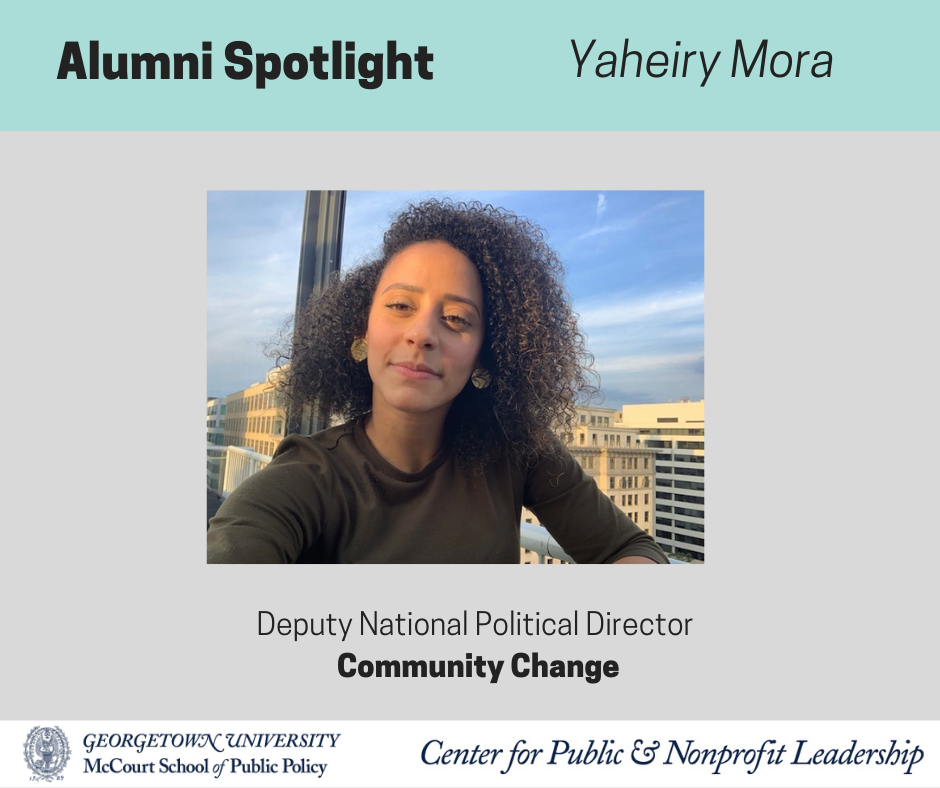Alumni Spotlight: Yaheiry Mora, Community Change

Posted in News Story Spotlight
Yaheiry Mora is the Deputy National Political Director at Community Change where she brings her experience in labor and community organizing, immigrant justice advocacy, and voter engagement work. Her identity as an Afro-Caribeña, immigrant and first-gen drives her passion in grassroots organizing to build political and electoral power in communities of color. Her experience in grassroots politics in MD, VA and PA led her to national level political movement building working with grassroots organizations from across the country to build power from the ground up.
This interview has been lightly edited for clarity.
Center for Public and Nonprofit Leadership (CPNL): What drew you to work in the nonprofit sector? And, how did you come to your current job?
Mora: I think what drew me to work in the nonprofit sector was a desire to change the system. I came by way of the labor movement, which is still under the nonprofit structure, but you do this work so that everyday people can have dignity at their workplace–good retirement, great benefits, and provide a great life for their families and themselves. I currently work at a national social justice organization. It was still that mission of change that drew me to this job. I’ve transitioned into more of a national view and lens for the work I do now.
Center for Public and Nonprofit Leadership (CPNL): Why did you choose to work outside of political institutions like State Legislatures?
Mora: I get asked so often if you want to work for an elected official, and my answer is no! That’s not where the power is, not where real change happens. I want to influence change and influence policy. The best way for me to do that as a woman of color and Afro-Latina is as an advocate, as someone who can bring together groups of people through direct organizing. As an immigrant to this country, civic engagement was also something that I had to learn, it was part of my process of setting roots. It essentially brings people together by understanding that we have political power. We can influence and impact policy through our vote by electing folks who understand our issues and getting people to talk about how a particular policy affects them. I can accomplish these goals more effectively by being outside and bringing others in my community to be part of the civic engagement process.
CPNL: How have you been able to center your identity and the identities of those you serve in your politics and work?
Mora: It’s obviously been a process. I initially led with the immigrant experience, from the thick accent to working in new spaces. My experiences intersected because when I saw my community members, I saw my aunt, my cousins. This is work I believe in and that I know will also impact my family. Another intersection of identity that leads my work is my main identity as a Caribbean woman, which acknowledges my African heritage. It shows intersectionality in struggles and issues. It’s not only about me being an immigrant or being seen as a Latina; it’s this common struggle and fight for equality, dignity, and liberation that ties us all.
CPNL: What accomplishment are you most proud of?
Mora: The work of community organizers is not glamorous by any means. I’ve been fortunate to challenge myself in many ways that people would celebrate, but what has made me feel more empowered and grounded in the work that I do is about building the bench. When I worked at the Labor movement, we represented janitors and doormen in New York City. These are the folks who work for real estate magnets, and in those jobs, they might be invisible to those they encounter and see every day. I was involved in managing the Members Electoral Program, where these individuals can get jobs and training around political work. That was a proud moment, seeing folks step into their power. You could be awesome, but if you’re not also helping others come up together and reach common access, you’re not building the movement. During my time managing voter engagement programs in MD, VA and PA, some folks I hired and trained became public interest lobbyists, some became my colleagues and entered our organization’s leadership, and others decided to work for elected officials offices and campaigns. Also, many voted for the very first time and became politically involved. They found a political home and saw how engagement could ultimately change their material conditions.
CPNL: How has the Certificate Program helped you in your career?
Mora: I loved it! The Certificate covers so many areas and is designed for folks already working in the nonprofit sector. You work through challenges that you are experiencing in real-time. For me, it has helped increase my perspective and skillset, like in financial management that I was not as familiar. Ultimately, it gave me a broader view of nonprofit management that will be key as I continue to grow into other roles.
CPNL: What advice would you give to other professionals who are considering participating in the Certificate Program?
Mora: I say this as a mom with a demanding job who likes to put time where I think I’ll get the best investment. I encourage everyone on this path to consider the program. First, it attracts people from so many nonprofit issue areas to have honest conversations which allow you to work through real challenges that we all encounter in a safe and respectful space. Do it when you feel you are at a point where you can benefit from being in that kind of cohort. I’m not an executive director, and I don’t think you have to wait until then to consider it.
